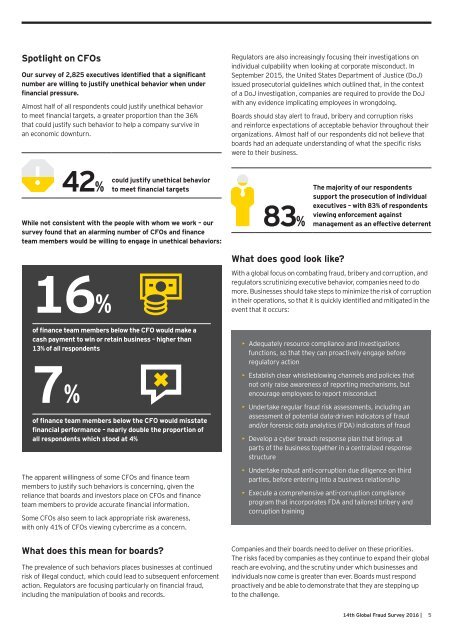Corporate misconduct — individual consequences
1VGrXvQ
1VGrXvQ
Create successful ePaper yourself
Turn your PDF publications into a flip-book with our unique Google optimized e-Paper software.
Spotlight on CFOs<br />
Our survey of 2,825 executives identified that a significant<br />
number are willing to justify unethical behavior when under<br />
financial pressure.<br />
Almost half of all respondents could justify unethical behavior<br />
to meet financial targets, a greater proportion than the 36%<br />
that could justify such behavior to help a company survive in<br />
an economic downturn.<br />
Regulators are also increasingly focusing their investigations on<br />
<strong>individual</strong> culpability when looking at corporate <strong>misconduct</strong>. In<br />
September 2015, the United States Department of Justice (DoJ)<br />
issued prosecutorial guidelines which outlined that, in the context<br />
of a DoJ investigation, companies are required to provide the DoJ<br />
with any evidence implicating employees in wrongdoing.<br />
Boards should stay alert to fraud, bribery and corruption risks<br />
and reinforce expectations of acceptable behavior throughout their<br />
organizations. Almost half of our respondents did not believe that<br />
boards had an adequate understanding of what the specific risks<br />
were to their business.<br />
42%<br />
could justify unethical behavior<br />
to meet financial targets<br />
While not consistent with the people with whom we work – our<br />
survey found that an alarming number of CFOs and finance<br />
team members would be willing to engage in unethical behaviors:<br />
83%<br />
The majority of our respondents<br />
support the prosecution of <strong>individual</strong><br />
executives – with 83% of respondents<br />
viewing enforcement against<br />
management as an effective deterrent<br />
16%<br />
What does good look like?<br />
With a global focus on combating fraud, bribery and corruption, and<br />
regulators scrutinizing executive behavior, companies need to do<br />
more. Businesses should take steps to minimize the risk of corruption<br />
in their operations, so that it is quickly identified and mitigated in the<br />
event that it occurs:<br />
of finance team members below the CFO would make a<br />
cash payment to win or retain business – higher than<br />
13% of all respondents<br />
7%<br />
of finance team members below the CFO would misstate<br />
financial performance – nearly double the proportion of<br />
all respondents which stood at 4%<br />
The apparent willingness of some CFOs and finance team<br />
members to justify such behaviors is concerning, given the<br />
reliance that boards and investors place on CFOs and finance<br />
team members to provide accurate financial information.<br />
Some CFOs also seem to lack appropriate risk awareness,<br />
with only 41% of CFOs viewing cybercrime as a concern.<br />
• Adequately resource compliance and investigations<br />
functions, so that they can proactively engage before<br />
regulatory action<br />
• Establish clear whistleblowing channels and policies that<br />
not only raise awareness of reporting mechanisms, but<br />
encourage employees to report <strong>misconduct</strong><br />
• Undertake regular fraud risk assessments, including an<br />
assessment of potential data-driven indicators of fraud<br />
and/or forensic data analytics (FDA) indicators of fraud<br />
• Develop a cyber breach response plan that brings all<br />
parts of the business together in a centralized response<br />
structure<br />
• Undertake robust anti-corruption due diligence on third<br />
parties, before entering into a business relationship<br />
• Execute a comprehensive anti-corruption compliance<br />
program that incorporates FDA and tailored bribery and<br />
corruption training<br />
What does this mean for boards?<br />
The prevalence of such behaviors places businesses at continued<br />
risk of illegal conduct, which could lead to subsequent enforcement<br />
action. Regulators are focusing particularly on financial fraud,<br />
including the manipulation of books and records.<br />
Companies and their boards need to deliver on these priorities.<br />
The risks faced by companies as they continue to expand their global<br />
reach are evolving, and the scrutiny under which businesses and<br />
<strong>individual</strong>s now come is greater than ever. Boards must respond<br />
proactively and be able to demonstrate that they are stepping up<br />
to the challenge.<br />
14th Global Fraud Survey 2016 |<br />
5


